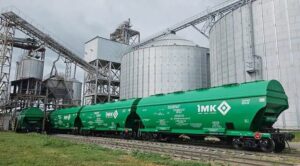
In 2024, the elevators of the IMC agricultural holding shipped a record volume of grain – more than 1.1 million tons, in January-June 2025, they completed the shipment of the remaining crop of 2024 and carried out preparatory work for the reception of the new harvest, the press service of the agricultural holding reported on Facebook.
The agricultural holding noted that in recent years, several projects have been implemented at IMC elevators as part of the Smart Green Strategy, in particular in the use of green energy.
“Four of IMC’s elevators have already been equipped with solar panels, and installation is underway at two more facilities, which will cover the demand for electricity from green sources for office buildings and critical infrastructure of elevators. This also contributes to the energy independence of the elevators and the continuous production process despite possible interruptions in electricity supply due to Russian shelling of Ukraine’s energy system,” IMC said.
In addition, two of IMC’s elevators and three grain drying complexes have installed heat generators that run on sunflower pellets and grain waste, which allows replacing natural gas with biofuel for the grain drying process.
“This year’s scheduled repairs at IMC’s elevators are already at the completion stage. We are currently disinfecting the production facilities. IMC elevators are ready to accept the new winter wheat harvest,” emphasized Andriy Havrylenko, Deputy CEO of IMC for Grain Storage and Processing.
IMC Agro Holding is an integrated group of companies operating in Sumy, Poltava and Chernihiv regions (north and center of Ukraine) in the crop production, elevators and warehouses segments. The land bank is 116 thousand hectares, storage capacity is 554 thousand tons, with a harvest of 864 thousand tons in 2024.
IMC ended 2024 with a net profit of $54.54 million against a net loss of $21.03 million in 2023. Revenue increased by 52% to $211.29 million, gross profit quadrupled to $109.10 million, and normalized EBITDA increased 25 times to $86.11 million.
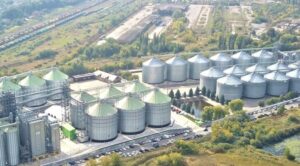
In Ukraine, despite the difficult situation and general pressure on the market, the construction of new elevators and the expansion of existing capacities continues, and demand for construction is not decreasing, according to the press service of KMZ Industries (Karlivsky Machine-Building Plant, KMZ, Poltava region).
“Speaking about us, when comparing the beginning of June 2024 and 2025, the increase in orders is about 15-17%. Quite a large number of our potential customers already have design solutions, sites for construction or expansion of existing facilities, and ready estimates, but are waiting for the security situation to improve (in the northern and eastern regions) or at least for some stability,” said Alexander Nebesky, commercial director of the company.
According to him, the company currently has 173 small, medium, and large projects in the pipeline. Most of the customers are located in western Ukraine, but there are also a number of customers from the Kyiv, Cherkasy, and Kirovohrad regions.
Nebesky noted that over the past two seasons, there has been a trend toward investment in the construction of elevators by processors or farmers who want to enter the processing business. Grain storage facilities are being built for joint operation with processing enterprises, feed mills, and bioethanol plants.
At the same time, farmers continue to build their own elevator facilities. Whereas large agricultural holdings previously dominated construction, this trend is now gaining popularity among medium and small agricultural enterprises.
“The number of farmers building their own grain storage facilities is growing. This allows them to store their harvest at a more favorable price and reduce their dependence on third-party elevators. Some farmers also provide storage services to other farmers located nearby,” Nebesky concluded.
KMZ Industries is the largest manufacturer of elevator equipment in Ukraine and produces a full range of products, including silos, grain dryers, transport equipment, and separators, as well as providing automation and installation services.
According to the company, it has built more than 5,000 facilities. KMZ Industries silos with a total volume of more than 12.5 million cubic meters are currently in operation.
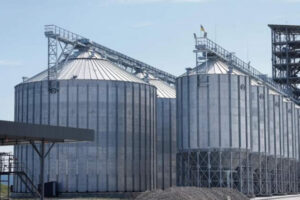
An elevator that will be able to store up to 30,000 tons of grain at a time, as well as a dry port, will be built in the Lviv region, according to Maksym Kozytskyi, head of the Lviv Regional Military Administration.
“This is the beginning of a large-scale project that includes hundreds of grain storage facilities throughout Ukraine, a network of dry ports, modern logistics hubs, deep processing plants, bioclusters, new export opportunities, and technological upgrades for the agricultural sector,” he wrote on his Facebook page.
A memorandum of cooperation was signed by the Lviv Regional State Administration, the Lviv Regional Council, the Belz City Council, and AgHoldCo, which, with the support of the UAF Partners investment fund, will finance 80-85% of the project’s cost. The Danish State Export Agency EIFO is also expected to contribute to the financing, thanks to which AgHoldCo intends to secure a $12 million loan for the construction of each elevator.
The contribution of the Belz community is estimated at no less than $3 million for each of the subprojects. This assistance will also include the selection and allocation of land plots, connection of the facility to engineering networks, and tax incentives.
The head of the Lviv Regional State Administration expressed confidence that the construction of the elevator and dry port in the region will provide jobs, help reduce grain transportation costs, and strengthen food security in the Lviv region. In addition, it will be easier for small and medium-sized farms to store grain.

The OKKO Group plans to open a new 60,000-tonne elevator by autumn 2025 and a bioethanol plant in summer 2026, OKKO Group CEO Vasyl Danylyak said in an interview with Tomas Fiala, co-founder of investment company Dragon Capital.
According to him, the company began construction of an 83,000-ton bioethanol plant last year. Only part of its production will be supplied to the domestic market, with the rest intended for export.
“In Ukraine, since May 1 of this year, there have been mandates to add 5% bioethanol to fuel in accordance with European standards, but this share may increase to 10%. Accordingly, after analyzing our market share, we decided to build a plant with a capacity of 83,000 tons. In addition, we worked with American consultants, who are number one in the market, on the format of the plant’s operation. Thanks to this, we chose the best option: it will work partly for our group and partly for export,” said Danylyak.
The CEO emphasized that by the fall of this year, the group of companies plans to complete the construction of a 60,000-ton storage elevator, and in June-July next year, it expects to fully launch the plant.
Danylyak also said that this year OKKO Group closed a deal to buy 17,000 hectares of land in the north of the Ternopil region and the south of the Rivne region, increasing its land bank to 50,000 hectares.
“As of today, we have a total of about 50,000 hectares under cultivation,” the top manager said.
He explained the interest in these regions by the favorable natural and climatic conditions and the best yield indicators compared to other regions.
Danylyak noted that an important component of OKKO’s agricultural portfolio is its partnership with the Gadz-Agro enterprise in the Ternopil region, in which the company acquired a stake in 2023. The enterprise cultivates 26,000 hectares of land and has about 10,000 head of cattle, of which 5,000 are dairy cows. It is also one of the largest horticultural farms in Ukraine, but OKKO decided not to integrate the horticultural part of the business.
OKKO Group unites more than 10 diverse businesses in the fields of manufacturing, trade, construction, insurance, services, and other services. The group’s flagship company is Galnaftogaz, which operates one of the largest petrol station chains in Ukraine under the OKKO brand, with around 400 petrol stations.
The founder and ultimate beneficiary of the group is Vitaliy Antonov.
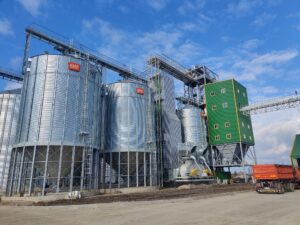
Vitagro Group is completing the construction of two new silos with a capacity of 11 thousand tons of simultaneous storage at its elevator in Izyaslav district, Khmelnytsky region, and is preparing a 15 thousand ton storage area in grain bins, the company’s press service reports.
According to the report, the total capacity of the elevator will increase to 66 thousand tons of simultaneous storage. The work is scheduled to be completed in early summer 2025 to store the new winter crop.
“We started working on the project in the fall of 2024. At the same time, we contracted equipment and planned the construction schedule. In total, approximately UAH 153 million will be spent on the first stage of the project. As part of the capacity increase, we will not only increase the storage volume but also add another working tower, which will allow us to accept two different crops at the same time and load grain in parallel on rail and road transport. At the same time, the shipment speed will increase from 1400 tons per day to 2300 tons per day,” explained Alexander Kulygin, Director of Grain Storage at Vitagro Group.
Vitagro reminded that it started developing the elevator business in 2017 with the construction of an elevator in Zakupne village, Kamianets-Podilskyi district, Khmelnytskyi region. The group now owns five elevators in Khmelnytsky and Rivne regions with a total capacity of 385 tons of simultaneous storage. The largest of them is in Zakupne. Its current capacity is 106 thousand tons.
Vitagro Group is one of the largest industrial groups in Ukraine with assets in the agricultural, energy, processing, construction and chemical industries. It was founded and has been operating since 1998. It owns enterprises in Khmelnytsky, Rivne, Volyn, Ivano-Frankivsk and Kyiv regions. The company cultivates about 90 thousand hectares of land and is engaged in livestock farming, horticulture, renewable energy, fertilizer and feed production, construction and building materials production. During the full-scale invasion, the group built and launched 5 processing plants. Vitagro is headquartered in Khmelnytsky.
According to the Unified State Register of Legal Entities and Individual Entrepreneurs, the ultimate beneficiary of the Vitagro investment company is MP Serhiy Labaziuk (For the Future parliamentary faction).
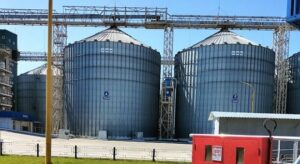
IT specialists of one of the largest grain market operators in Ukraine, JV Nibulon LLC, together with the IT-Enterprise team, have completed the restart and digitalization of the quantitative and qualitative accounting of the elevator network, the grain trader’s press service reported on its Facebook page.
According to the report, the project to optimize quantitative and qualitative accounting included improvement of business processes for grain accounting, additional processes for logistics management and costing.
“The establishment of a new efficient version of the quantitative and qualitative accounting business process made it possible to automatically track the movement of grain, its key indicators, and the funds spent on processing and transportation from the moment it arrives at the elevator to the shipment to the end consumer. This allows us to calculate the exact cost price and, accordingly, the profitability. And most importantly, we understand what impact can be made at each stage to improve financial and service performance,” said Nibulon’s IT Director Mykola Riasko.
The ultimate goal of the project is to switch to a fully digital elevator model, the principle of which is based on managing and coordinating all processes with digital systems. This concept is gradually being scaled up to all 23 Nibulon elevator complexes.
“If we describe the results of the quantitative and qualitative accounting digitalization project in three theses, firstly, it is the simplification and automation of business processes, and the acceleration of their passage. Secondly, it is the accuracy of accounting, which ensures the clarity and relevance of the company’s financial position. Thirdly, it is more customer-oriented, as the process of providing services has become better and faster,” emphasized Ryasko.
Nibulon added that the digitalization project also contributed to the unification of accounting processes at all branches of the company and improved integration with equipment and third-party systems, which ensured effective management of business processes.
JV Nibulon LLC was established in 1991. Prior to the Russian military invasion, the grain trader had 27 transshipment terminals and crop reception complexes, capacity for simultaneous storage of 2.25 million tons of agricultural products, a fleet of 83 vessels (including 23 tugs), and owned the Mykolaiv Shipyard.
“Before the war, Nibulon cultivated 82 thousand hectares of land in 12 regions of Ukraine and exported agricultural products to more than 70 countries. In 2021, the grain trader exported the highest ever volume of 5.64 million tons of agricultural products, reaching record volumes of supplies to foreign markets in August – 0.7 million tons, in the fourth quarter – 1.88 million tons, and in the second half of the year – 3.71 million tons.
Nibulon’s losses due to Russia’s full-scale military invasion in 2022 exceeded $416 million.
Currently, the grain trader is operating at 32% of capacity, has created a special unit to clear agricultural land of mines, and was forced to move its headquarters from Mykolaiv to Kyiv.